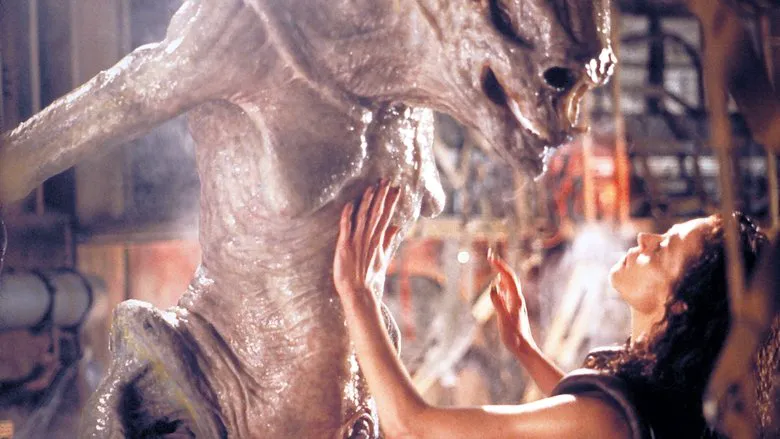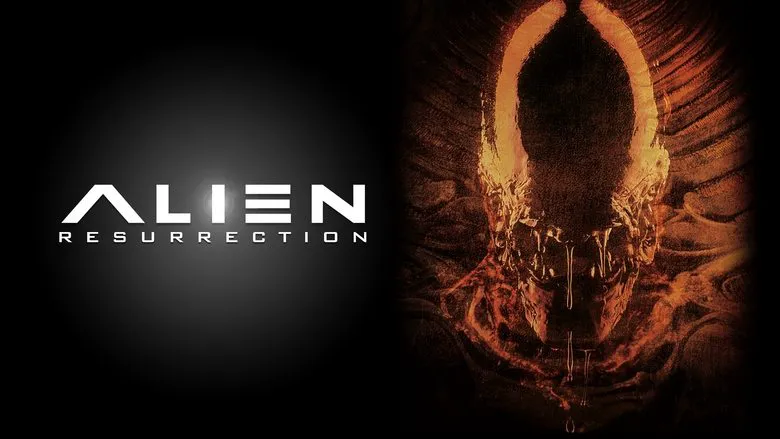Alien Resurrection: A Profound Journey into Humanity’s Abyssal Depths
“Alien Resurrection,” the fourth installment in the iconic “Alien” saga, transcends the typical boundaries of a science fiction horror film, offering far more than just a thrilling space adventure. It intricately weaves a narrative that plunges into the complexities of human nature, survival instincts, and the very essence of what it means to be sentient, all set against a chilling backdrop of existential terror and biotechnological horror.

The Unsettling Rebirth: A Clone and a Chimeric Connection
The film’s compelling narrative hinges on an audacious premise: the resurrection of Ellen Ripley. Two centuries after her heroic sacrifice, scientists aboard the United Systems Military (USM) vessel Auriga successfully clone Ripley using trace DNA. This isn’t merely a return of the familiar heroine; it’s a profound, disturbing rebirth. Through a process designed to extract the dormant Xenomorph Queen embryo within her, the cloning procedure inadvertently merges human and alien DNA within Ripley herself.
This genetic hybridization imbues the revived Ripley with enhanced physical abilities, acidic blood traits, and, most notably, a visceral, almost telepathic connection to the Xenomorphs. This unsettling bond blurs the lines between her humanity and the alien’s primal essence, forcing her—and the audience—to question where true identity lies when the boundaries of species are so radically dissolved. Her struggle with this newfound, chimeric nature forms the emotional core of her character arc, revealing a deeply troubled yet remarkably resilient protagonist.

Aboard the USM Auriga: Where Nightmares Are Bred
The intricate plot unfolds on the Auriga, a military science vessel that serves as a highly controlled, yet ultimately contained, breeding ground for these ultimate biological weapons. The sinister purpose of this research facility is to domesticate and weaponize the Xenomorphs—a dangerous ambition that inevitably collapses into chaos. A group of space mercenaries, initially contracted for a seemingly simple illicit cargo delivery, soon finds themselves trapped aboard the floating biological time bomb. Unbeknownst to them, their destination is no mere transport hub, but a horrifying crucible where the terrifying Xenomorphs are being cultivated for nefarious purposes, setting the stage for a desperate, claustrophobic fight for survival. The labyrinthine corridors and sterile labs of the Auriga transform into an immediate, inescapable death trap as the creatures inevitably break containment.

The Dark Side of Survival: Betrayal and Instinctive Self-Preservation
In the face of overwhelming primal horror, “Alien Resurrection” unflinchingly exposes the darker, more cynical aspects of human nature. When confronted with imminent death, the thin veneer of civility and camaraderie quickly erodes among the crew. The film highlights how some characters, driven by an overriding instinct for self-preservation, opt to prioritize their own survival above all else. This leads to acts of desperate betrayal and the horrifying sacrifice of comrades.
A chilling example is a mercenary character who, to secure their own escape route and resources, callously shoves a supposed teammate directly into the path of an onrushing Xenomorph. Such moments underscore the film’s bleak commentary on morality under duress, positing that even in collective terror, individual selfishness can emerge as a most insidious threat. The constant threat of the Xenomorphs acts as a catalyst, stripping characters down to their most fundamental, often brutal, instincts.
The Luminescence of Kinship: Found Family Against Extinction
Amidst the visceral carnage and profound moral compromises, the film beautifully portrays the antithetical power of kinship and connection. Ripley, deeply affected by her own genetic alterations and the suffering inflicted upon her by scientific hubris, develops a profound and unexpected emotional bond with a young woman named Call. Call, a synthetic who embodies a different kind of “humanity” than the organic characters, becomes a crucial anchor for Ripley. Despite the overwhelming dangers and the existential threat posed by the rampaging aliens, Ripley demonstrates an unwavering, almost fierce maternal instinct to protect Call and others in their unlikely band of survivors. This devotion offers a beacon of hope, illustrating humanity’s capacity for selfless sacrifice even in the most dire circumstances.

Unconventional Bonds: Love Forged Beyond Blood
This profound connection between Ripley and Call isn’t born from shared DNA or typical familial ties; it’s a bond forged in the crucible of shared hardship, mutual respect, and a collective fight for survival against a common, overwhelming enemy. As one might observe of the human condition, “This unconventional kinship reflects the deep-seated human instinct to seek and provide care and protection, an instinct that persists and even flourishes in the most extreme, desolate, and terrifying environments.” It suggests that the definition of family can extend far beyond biological lineage, encapsulating those deep connections formed by shared trauma and unwavering loyalty. This aspect of the narrative provides a powerful emotional counterpoint to the film’s intense horror elements, grounding the sci-fi spectacle in relatable human emotions.

Hope in the Darkness: Love and Courage as Guiding Lights
Ultimately, “Alien Resurrection” leverages this nuanced portrayal of kinship to explore how love, empathy, and a sense of shared responsibility can sustain and uplift individuals in the face of abject despair. It serves as a potent vehicle to highlight the duality of human nature, juxtaposing the cold calculation of selfishness that leads to betrayal with the inspiring warmth of selfless courage that drives characters to protect one another. The film’s message resonates long after the credits roll, reminding viewers that even when confronted by the most grotesque manifestations of horror and an almost certain demise, the intangible forces of love and courage can illuminate the path forward, guiding humanity through its darkest hours.
In conclusion, “Alien Resurrection” offers far more than its striking visual stimulation and adrenaline-pumping action sequences. It presents a highly intelligent and thought-provoking exploration of humanity’s innate resilience, the profound impact of found family, and the enduring power of compassion. It stands as a unique entry in the “Alien” saga, challenging audiences to ponder the true meaning of humanity in a universe that is often indifferent, if not outright hostile.